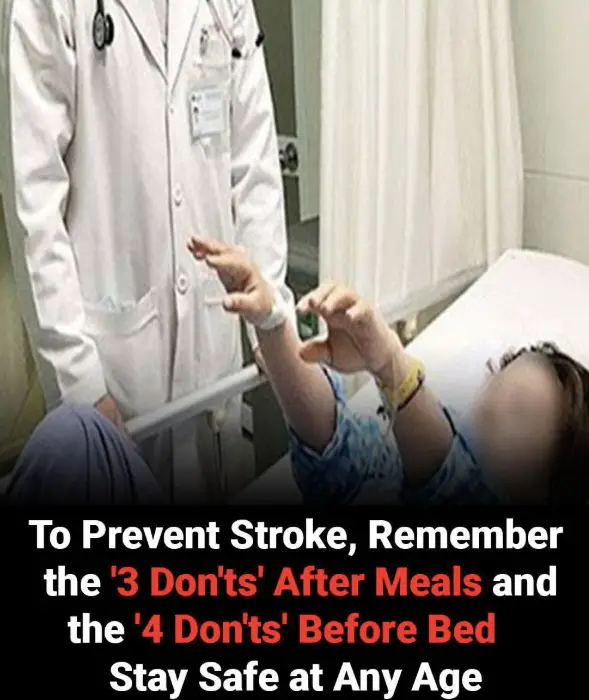
Introduction
Every year, strokes affect hundreds of thousands of people—many of whom had no idea they were at risk. While age, genetics, and underlying health conditions play a role, research increasingly shows that daily habits—especially those around meals and sleep—can significantly influence your risk.
Stroke is the second leading cause of death globally and a major cause of disability. But many strokes are preventable. You don’t need expensive medications or complex routines to protect your brain. Instead, focus on simple changes at two crucial times of the day: after eating and before sleeping.
Let’s break down the “3 Don’ts” after meals and “4 Don’ts” before bed that could reduce your stroke risk—especially for older adults.
The “3 Don’ts” After Meals
1. Don’t Smoke
Lighting up after a meal may be a long-standing habit for some, but it’s particularly dangerous. After eating, your blood is redirected to your digestive system. Smoking constricts blood vessels and reduces oxygen flow, increasing the risk of blood clots—a leading cause of ischemic stroke.
If you smoke, consider this a critical moment to pause—or better, to quit entirely.
2. Don’t Shower Immediately
A warm shower may seem relaxing after a meal, but it can disrupt digestion. Hot water causes blood to rush toward the skin’s surface to regulate temperature, pulling it away from internal organs and the brain. This can result in dizziness, poor digestion, or even fainting—particularly in seniors.
Wait at least 30–60 minutes after eating before showering.
3. Don’t Lie Down or Nap Right Away
While it’s tempting to rest after a big meal, doing so can cause acid reflux, indigestion, and reduced blood circulation. Over time, these contribute to obesity, high blood pressure, and cardiovascular problems—all linked to stroke.
Instead, stay upright and gently active for at least 30–60 minutes.
The “4 Don’ts” Before Bed
1. Don’t Eat Heavy or Late Meals
Late-night eating can disrupt your sleep and overload your digestive system. It can raise blood sugar, cholesterol, and inflammation, all of which strain the heart and brain.
Try to finish eating at least 2 hours before bedtime and avoid heavy, rich, or spicy foods.
2. Don’t Drink Alcohol Before Sleeping
Alcohol may help you fall asleep quickly but often leads to poor-quality sleep, blood pressure spikes, and heart rhythm issues—especially dangerous if you have undiagnosed AFib (atrial fibrillation), which causes nearly 1 in 3 strokes.
If you drink, avoid alcohol for several hours before going to bed.
3. Don’t Use Screens Excessively
Blue light from phones, tablets, or TVs suppresses melatonin, your body’s natural sleep hormone. This leads to sleep disruptions, higher stress hormones, and elevated blood pressure—all stroke risk factors.
Power down screens at least 30 minutes before bed. Choose a book, calming music, or gentle stretches instead.
4. Don’t Sleep in the Cold Without Proper Warmth
Cold environments can cause blood vessels to constrict, reducing circulation to the brain. In seniors, this may trigger nighttime strokes, especially when compounded by high blood pressure.
Keep your bedroom comfortably warm, and wear adequate clothing or use extra blankets.
Why These Habits Matter—Especially With Age
As we age, the body becomes more sensitive to lifestyle-related triggers. Poor digestion, disrupted sleep, and circulatory issues may seem minor, but over time, they contribute to systemic inflammation, clot formation, and high blood pressure—the three key risk factors for strokes.
Implementing these “don’ts” can help:
Improve blood flow and reduce clot risk
Support restful, restorative sleep
Lower inflammation and blood pressure
Protect your heart and brain over the long term
And the best part? These changes are free. No medication, no side effects—just everyday mindfulness.
Stroke Prevention Starts at Home
You don’t need to make radical changes to safeguard your brain. Simply start with awareness:
Avoid smoking or bathing immediately after eating
Stay upright for better digestion
Limit late-night meals, alcohol, and screen time
Sleep in comfort and warmth
These small decisions made daily have the power to prevent big problems later.
Because prevention doesn’t begin in the doctor’s office—it begins in your home, at your dinner table, and in your evening routine.
Your brain is worth protecting.
And sometimes, the best way to protect it… is by simply doing less at the right time.




